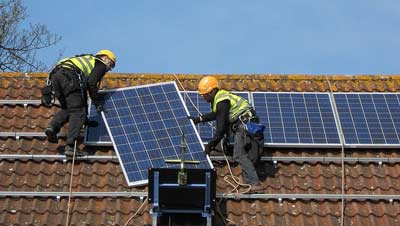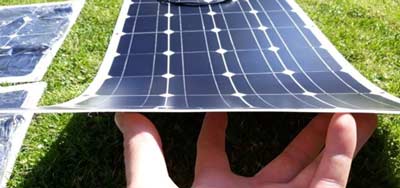You may have noticed that solar panels are becoming a more common sight on homes in the UK. Solar panels can help to cut electricity bills for homeowners and help you become sustainable, use fewer fossil fuels, and reduces your reliance on the grid.
If you are thinking of installing solar panels, it will be helpful to understand more about the weight and if your roof is suitable.
What do standard solar panels weigh?
Understanding the size and weight of solar panels is important if you are considering installing them on your rooftop.
- Most solar panels weigh around 40 pounds (18kg) each but can weigh around 30-50 pounds (13-22 kg).
In terms of size, most solar panels are 65 inches by 39 inches (5.4ft by 3.25ft) and contain around 60 solar cells. These panels are great for the average home, but if you are installing them on a commercial property, larger panels are available which contain around 72 solar cells.
Most photovoltaic (PV) modules have similar weight and measurements, but there may be
be some variations due to:
- The brand
- Technology and components used
- The size of your home
- Commercial or domestic use
- The design of your home
- Your energy requirements

Why do solar panels weigh on average 40 pounds?
You may be wondering where the weight of solar panels comes from. Although they are slimline, the multiple components contribute to the overall weight of the panel.
The glass supplies most of the weight, and the other components are:
- Aluminium frame.
- EVA sheets (Encapsulation foil)
- Solar Cells
- Junction box
Different types of PV panels?
Solar panels come in a variety of styles which will impact the performance, weight, and cost. Here are the most common types on the market.
What is the weight of monocrystalline panels?
Monocrystalline solar panels are made from single-crystal panels. They are more expensive but are more efficient over time. They are generally smaller and weigh around 30-40 pounds (13-18kg) so occupy less space with great energy output.
What is the weight of polycrystalline panels?
Polycrystalline panels have improved over the years to become a popular choice overall. They are not as energy efficient as Monocrystalline panels, but they are cheaper and work well.
On average, polycrystalline panels weigh around 42 pounds (20kg) per panel and modern technology means they are always improving.
What is the weight of amorphous panels?
If cost is important, thin-film panels are the cheapest option. Amorphous panels are made with a photovoltaic film which weighs much less than standard panels and makes them more flexible. It is the type you would find in a solar-powered calculator.
Generally, amorphous solar panels weigh around 15 pounds (6kg) per panel. They are larger and less energy efficient, but they are the cheapest option on the market.

Is your roof suitable for the weight of solar panels?
Not every property will be suitable for solar panels. If you are planning to install solar panels, it is important to know your roof can support them first.
On average, the total weight that will be loaded onto your roof is around 4 pounds for every square foot. Newer homes are likely to be able to handle the weight of solar panels but if you have an older home, the roof may not be as strong.
Before you install the panels, you must have a thorough roof inspection by a professional. You should also consider:
Roof type: Solar panels can be installed on flat and slanted roofs. An installer will assess the angle of your roof and install them to account for the slope.
They will then adjust the panels to get the optimum angle and orientation. The more work and components that are needed, the more expensive the installation will be.
The position of your home: The more southerly facing your home is, the more electricity your panels will produce. Within 90 of the South is an ideal position. You can check your home on Google Maps to find out.
Also, think about how much shade your home is in throughout the day.
Planning permission: It is unlikely you will need planning permission for solar panels but checking first is best practice. Especially if you rent your property.
Roof material: Solar panels will need different supports depending on your roof type and will be secured using a frame and brackets that are appropriate for your roof material.
Get quotes from solar panel installers
You should hire a professional solar panel installer to fit your panels safely and professionally. They will certify that your property is suitable and ensure you get the most from your solar panels.